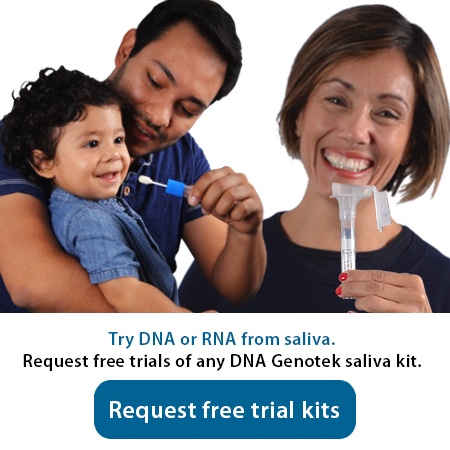2012-07-03
The BMC Medical Genomics Journal recently published the results of a study titled “Saliva samples are a viable alternative to blood samples as a source of DNA for high throughput genotyping”. The study examined the feasibility of collecting DNA from saliva as a non-invasive, economical substitute to DNA from blood samples for use on genome-wide arrays. The two arrays used for the study were the Applied Biosystems Taqman™ and Illumina BeadChip arrays.
79 participants from the Pharmacogenetics of Breast Cancer Chemotherapy study were recruited to provide both a blood sample and a saliva sample (collected with Oragene) for analysis. A subset of ten matched pairs of blood and saliva samples were evaluated with a spectrophotometer to assess the purity of each sample, while three other matched sample pairs were tested for fragmentation through microchip electrophoresis. When compared to the blood samples, the saliva samples had similar ratios of absorbance (mean 1.56 for saliva versus mean 1.71 for blood, with an ideal ratio of 1.8) and demonstrated similar amounts of fragmentation. The study identified greater protein contamination in the saliva samples, but proceeded to note that the small differences in quality between the two sample types had a negligible effect on any of the assays. The complete results of both tests are available in the original report.
The DNA from the remaining saliva and blood samples was extracted and measured with Picogreen. The study was designed around a 2ml saliva sample collected with Oragene and a 9ml blood sample. The results revealed that all of the saliva samples (with a single exception) provided enough DNA to generate a successful genotype using both the Biosystems Taqman™ and Illumina BeadChip arrays.
The report concludes by stating saliva samples are a reliable, cost-effective solution to the logistical complexity and low compliance rates associated with collecting blood samples for high throughput genotyping. While the individual saliva collection kits (Oragene) are more costly than the blood sampling kits, this expense is offset by the increased cost of requiring trained staff to obtain the blood samples. In addition, the report notes an increased cost in the commercial extraction of DNA from blood when compared to saliva (£8/blood sample vs £5.10/saliva sample for a Gen-Probe extraction).
What are you finding in your research projects? Are your results similar to those found in this report?


